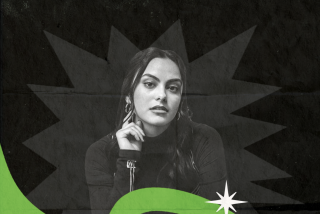What’s in a Name? Sometimes, Silliness
- Share via
RIO DE JANEIRO — Open the phone book and embark on an expedition into the wondrous world of Brazilian names.
A quick search unearths gems: Welfare Almeida, Nostradamus Coelho, Waterloo da Silva, Ben Hur Euzebio and Flavio Cavalcanti Rei da Televisao (King of Television) Nogueira.
Let’s call one of these people and find out what the heck is going on with these names.
“My grandfather’s name was Moacir, which in the Tupi Guarani indigenous language means Bad Omen,” explains Welfare Almeida, an anesthesiologist. “So he named my father Welfare, because it meant well-being, which was the opposite. And there was a famous English soccer player in Sao Paulo named Harry Welfare.”
All that seems exotic, but it’s actually run of the mill. Parents in Brazil have named their children Xerox, Skylab, Nausea, D’Artagnan, Barrigudinha (Little-Bellied Girl), Colapso Cardiaco (Cardiac Collapse), Saddam Hussein (known by the affectionate diminutive Saddamzinho), Antonio Morrendo das Dores (Dying of Pain) and, in a prodigious burst of inspiration in the city of Recife eight years ago, Tchaikovsky Johannsen Adler Pryce Jackman Faier Ludwin Zolman Hunter Lins.
Brazilians have elevated names to an art form as playful and magical as their music and dance. Brazilians see naming a baby as an opportunity to have fun. Names become talismans; badges of creativity and individualism. Names tell short stories about the dazzling blend of cultures that makes up this society, the layers of superstition and inequality, the tolerance and snobbery, dreams and improvisation.
“In Brazil, the act of naming has a strong magical content,” says Elaine Rabinovitch, a Sao Paulo psychologist who studies the psychology of names. “We have this mixed identity that comes from a colony composed of indigenous peoples, African slaves and Europeans. And we have an extraordinarily rich oral tradition. Brazilians are always inventing words. Many names are given simply because the parents like the sound.”
Brazilians are not the only citizens of the hemisphere with a flair for language, of course. There are parallels in other Latin American nations. Just across the border from Southern California, in Tijuana, for example, a glance at a newspaper turns up the likes of Dante, Espartaco, Galileo, Hodin, Cuauhtemoc and Odilon.
In Brazil, however, almost anything goes. The freewheeling mentality contrasts with the policies of neighboring nations such as Argentina, where the repressive legacy of Spanish colonists lingers.
Names are a solemn ritual at the registrar’s office in Buenos Aires, the Argentine capital. The bureaucracy maintains a list of acceptable names--mostly of classic Roman Catholic-Spanish origin--which exudes the authority of a sacred document.
Until last week, when federal authorities decided to loosen the restrictions, Argentine parents who picked for their baby a name that was not on the list risked the disconcerting experience of having a haughty clerk reject their choice and send them home to think up an acceptable one. One Jewish Argentine couple won approval for a Hebrew name for their baby girl by presenting a letter from the Israeli Embassy authenticating the name’s existence.
Officialdom here in Rio is far less uptight. In the working-class Estacio neighborhood, the authority to whom parents come to register newborns is the kindly area registrar, Waldner Quintanilha, whose father’s name was Wagner.
Names Too Long Even for Computers
The white-haired, rumpled Quintanilha has worked 51 years in the windowless, street-front office, with its dusty volumes lining shelves and the continuous murmur of computer printers. Asked about any rules governing names, he smiled ruefully over his spectacles like a schoolteacher caught in the middle of a food fight.
“We are more open in Brazil,” he says. “People commit every grammatical aberration you can imagine. Sometimes we get names so long they won’t fit in the computer.”
Quintanilha wrote a manual addressing the proper spelling of first names. Although he tries to share his expertise, parents insist on phonetic versions, and delight in inserting the letters K, W and Y, which are not used in Portuguese, the language spoken in Brazil.
“They say they like the way a name looks,” he says. “They are concerned more with the visual appearance than the etymology.”
Hence Diana, popular because of the late Princess of Wales, becomes Tayane. Carolina becomes Kerolyne. Malcolm becomes Myacon. William Holden becomes Willi Horner. Edison, a homage to the U.S. inventor, becomes Edson, the first name of the soccer legend known around the globe by his nickname: Pele.
Edson, Robson, Anderson and Washington are favorite first names in Rio’s favelas, or slums, partly because of the percussive “on” sound and partly because American-sounding names are seen as cool and classy.
A step higher on the socioeconomic ladder, lower-middle-class families go to more elaborate lengths, according to Quintanilha.
“By seeking status, some cross the line into silliness,” he says, asking an employee to bring him the office’s hand-scrawled, three-page list of “extravagant” names compiled over the years.
“Let’s see: Adolfo Hitler, we had a lot of those during World War II. . . . Siddartha . . . Michael Jackson . . . Concetta Trombetta Diletta . . . Highlander . . . Marafona, which is a synonym for prostitute. Imagine naming your kid that.”
There is also a countertrend toward simple, classic names--especially among the wealthy and upwardly mobile.
Theoretically, Brazilian law forbids names that could expose children to ridicule. In 1990, a magistrate in the northeastern city of Salvador drew the line and refused to let Miraldo do Moura Eugenio, a carpenter, name his son Rambo. The judge rejected the mother’s compromise proposal: Sylvester Stallone.
The defiant father told reporters that he would inscribe the child in another city, declaring: “He’s my son, and I’ll name him anything I want.”
Mothers Generally Have Final Say
The law is enforced sporadically at best, although some parents eventually have second thoughts.
“When the kid gets to be school-age and everybody teases him, some people come back and change the name,” Quintanilha says.
Sometimes, Quintanilha persuades fathers to reconsider a bizarre choice, then watches them return sheepishly after a scolding from their wives. Brazilian mothers usually dominate the choosing of names, according to Rabinovitch, the psychologist. Their selections often “compensate for their frustrations and needs,” she says.
This national idiosyncrasy has historical and geographical roots in the impoverished northeast. The region, the source of mass migration to big cities, was the place where the Portuguese founded their colony 500 years ago. Although the society they established remains profoundly unequal, the colonists had more flexible and tolerant attitudes than the Spaniards toward issues such as the mixing of races and cultures.
Not Enough Last Names to Go Around
Beyond the confines of the Portuguese elite of about 400 families and their colonial staff, the masses were mixed-race peasants and slaves of African descent living in an environment in which relationships were often unofficial and names were sometimes made up or adopted from masters.
Flamboyant first names also offered a shield against anonymity, because of the limited supply of Portuguese last names. Today, an abundance of De Souzas, Dos Santoses and Nascimentos forces Brazilians to provide both parents’ names as identification for bureaucratic procedures.
“It’s natural when you have a common last name to look for a ‘really different’ first name that makes an individual stand out,” Rabinovitch says.
After independence, Brazil developed a stratified but curiously informal society in which even politicians were known by their first names. The members of the influential Rosado clan of the state of Rio Grande do Norte were named after numbers in French: Un, Deux, Trois, and so on, up to the popular Vingt-Huit, or 28.
Today, Brazilians routinely address dignitaries by their first names, perhaps attaching a title, as in “Dr. Roberto,” or “Professor Marcelo.” Newspapers refer to President Fernando Henrique Cardoso simply as “Fernando Henrique.” Three-time presidential candidate Luiz Inacio da Silva is known as Lula, his moniker; he legally incorporated it into his official name when he realized he was in danger of losing countless votes.
Nicknames are as much a national sport as soccer. The most prominent example, former President Jose Sarney, was born Jose Ribamar Ferreira de Araujo Costa. But he changed his name when he entered politics, because everyone knew him as “Jose, Sarney’s son.” His grandfather had named Jose’s father Sarney, after an executive of the British electricity company where the grandfather worked: Sir Ney.
“It’s madness,” says Mario Souto Maior, author of a dictionary of names culled over three years from a stack of phone books taller than he is. “I don’t know if there is any real explanation other than the creativity and imagination of Brazilians.”
There is a method to the madness, and a religious and mystical influence. Inspiration comes from a pantheon of saints revered by worshipers who blend Catholicism and Afro-Brazilian creeds. Another source is the animal lottery, a kind of urban numbers game based on superstitions that imbue animals and dates with good luck. Souto’s dictionary includes the entry Antonio Treze de Junio de Mil Novecentos e Dezesette (June 13, 1917).
Improvisation flavors not just music but Brazilians’ cheerful, resourceful responses to the challenges of daily life; it inevitably plays a role in names.
Parents copy from soap operas, movies, songs, domestic appliances. Or they fuse names: Gustavo and Maria might call a son Gusmar. Or they turn last names around, producing concoctions such as Onurb Bruno, a judge here. His brother is . . . Onurd.
When reached by phone, a somewhat wary Waterloo da Silva asserted that his name is not especially unusual. He admitted, however, that it has caused him a certain amount of grief over the years. His father christened him Waterloo because he planned to go to England to work and thought it would help his son fit in..
“It’s been a problem sometimes,” Da Silva says. “But on the other hand, I’ve met a lot of people with the same name as me.”
More to Read
Sign up for The Wild
We’ll help you find the best places to hike, bike and run, as well as the perfect silent spots for meditation and yoga.
You may occasionally receive promotional content from the Los Angeles Times.






